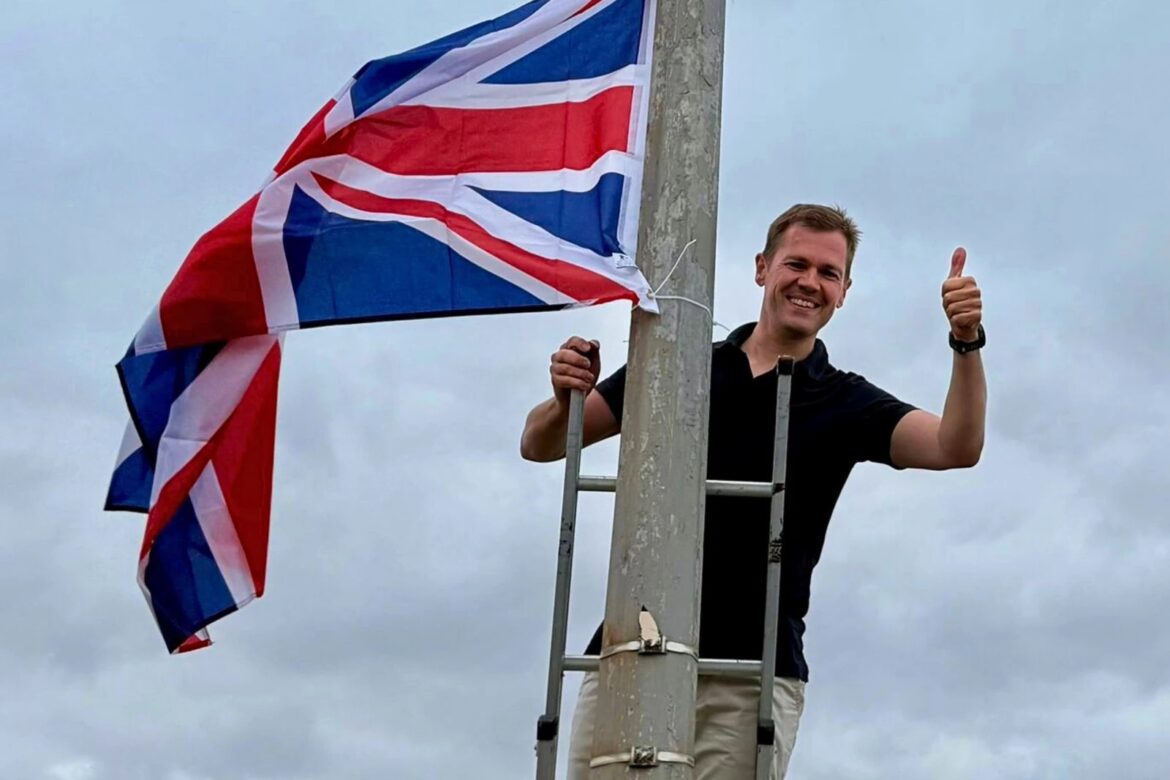Robert Jenrick has been spotted raising Union Jacks over Newark as part of the so-called “Operation Raise the Colours”, amid growing controversy over councils removing British flags whilst Palestinian banners remain untouched.
The Shadow Justice Secretary, 43, visited volunteers in his Nottinghamshire seat on Wednesday before hoisting the national flag on lampposts on Beacon Hill Road. Images from the town showed Mr Jenrick grinning as he stood on a stepladder, apparently after affixing a flag to a pole. He was also seen smiling with three volunteers on the roadside.
The top Tory’s campaign on home soil came after he called for Britain to “be one country, united under one flag” in response to Birmingham City Council, which removed British flags from lampposts whilst leaving Palestinian flags untouched. “Birmingham Council seem to be ashamed of our country – celebrating everyone other than ourselves,” Mr Jenrick fumed. “This pathetic self-loathing needs to end.”
The Shadow Justice Secretary has condemned what he describes as “blatant two-tier bias against the British people”, after leaked emails revealed Birmingham City Council admitted it was “too scared” to remove Palestinian flags without police protection.
In a leaked email from February, cabinet member Majid Mahmood reportedly wrote: “We are taking these down, but we need the support of the police due to issues that have cropped [up] when we first tried to take them down.”
In response, patriotic grassroots activists have launched the informal “Operation Raise the Colours” movement, which has made an impact nationwide. Joseph Moulton, an organiser with Flag Force UK, told GB News that his group wanted to make a “positive impact” rather than just “complaining on social media.
For us, raising the flag and tidying the local area is about mobilising the community, rekindling social responsibility, and restoring pride in where we live,” Mr Moulton told Britain’s News Channel.
Shadow Home Secretary Chris Philp has backed the movement, stating: “The Union Flag and St George’s Cross are part of our national identity. Displaying these flags shouldn’t just be allowed – it should be encouraged, and they should fly with pride.”
“Councils like Birmingham and Tower Hamlets allowed flags of other countries to be displayed for weeks or months. But at the first sign of our national flags and they come straight down. More two-tier policy. It is simply wrong,” Philp added.
The controversy has spread beyond Birmingham, with Tower Hamlets Council in east London also vowing to remove British flags “as soon as possible. The Aspire Party-led council claimed they were attached to council infrastructure without permission, despite Palestinian flags having flown in the borough for months following the start of the Israel-Hamas conflict.
Tower Hamlets previously allowed Palestinian flags on council property following Israel’s 2023 incursion into Gaza. These banners were only removed in 2024 after complaints from Jewish residents, who found them “oppressive and intimidating.
Birmingham City Council has confirmed they had removed over 200 items from street furniture this year, including Palestinian flags, though some had been subsequently replaced. The council maintains that “People who attach unauthorised items to lampposts could be putting their lives and those of motorists and pedestrians at risk.”
However, critics have pointed out that whilst Union Jacks were swiftly removed over safety concerns, Palestinian flags have remained in areas such as Sparkhill, where approximately 80 per cent of residents are Muslim. When reporters visited the area, there were no fewer than seven Palestine flags hanging from lampposts on a mile-long stretch of Stratford Road.
Flags have been hoisted from the South Coast to the North East, with the Prime Minister even appearing to back the drive. The PM’s official spokesman said on Monday: “I think the PM has always talked about his pride of being British, the patriotism he feels. I think he’s talked about that previously […] not least recently in relation to the Lionesses’ successful campaign in the Euros.”
Asked whether the Prime Minister was supportive of people who raised English flags, the spokesman said: “Absolutely, patriotism, putting up English flags. We put up English flags all around Downing Street every time the English football team – women’s and men’s – are out trying to win games for us.
Former Conservative leader Sir Iain Duncan Smith called the flag removals “shameful”, whilst Reform UK MP Lee Anderson described it as showing “utter contempt for the British people. Former Home Secretary Suella Braverman called the national flag “a great source of pride and patriotism” which “should be flown from as many places as possible as often as possible.
The movement has spread to towns and cities including Bradford, Newcastle, Norwich, Swindon and the Isle of Wight, with activists putting up England and UK flags in defiance of council bans. In Birmingham, campaigners even painted roundabouts in St George’s Cross colours after the council removed their flags.
Reform UK has launched a “patriotic flag pact” with all 12 of its councils vowing not to remove St George’s Cross and Union Jacks from lampposts. Leader Nigel Farage said: “Union flags and the Cross of St George should and will fly across the country. Reform UK will never shy away from celebrating our nation.
The controversy has exposed deep cultural tensions in Britain’s diverse cities. Whilst supporters see it as peaceful expressions of national pride, some residents in multicultural areas have expressed concerns. Tower Hamlets residents have described how they have been left feeling intimidated by St George’s Cross flags being put up in the borough, including close to a hotel housing asylum seekers.
Government guidance published in 2021 encourages the flying of the Union Flag on all UK government buildings throughout the year, explicitly stating: “We are keen for local authorities and other local organisations to follow suit.
As the flag row continues to escalate across Britain, it has become a flashpoint in debates about national identity, multiculturalism and what critics call “two-tier” treatment of different communities in modern Britain.
Follow for more updates on Britannia Daily



